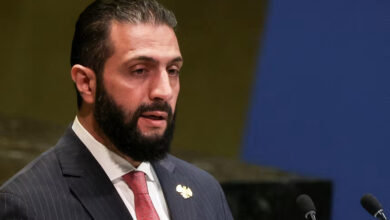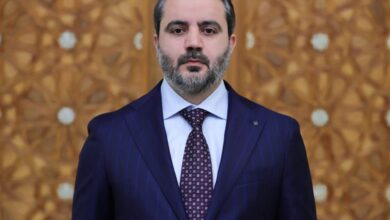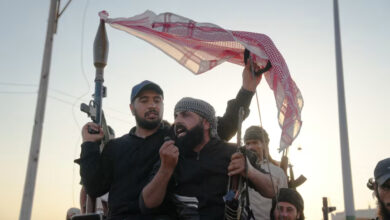
Syrian war planes attacked towns in the country's north and east and killed at least five civilians in a strike on an olive oil press as fighting raged in the capital Damascus on Tuesday, opposition activists said.
The latest fighting follows recent battlefield gains by the rebels in their struggle to topple President Bashar al-Assad, but it is far from clear if a strategic breakthrough is likely.
More than 90 people were killed on Tuesday, according to the Syrian Observatory for Human Rights, a Britain-based group.
Rebels trying to make inroads into the capital battled government forces in the suburb of Kfar Souseh on the edge of the center of the capital, activists said.
In Aleppo province in the north, rebels shot down a military helicopter, according to video footage posted on YouTube that showed what appeared to be a missile hitting the aircraft.
Security sources and activists have reported a small but growing number of heat-seeking anti-aircraft missiles entering Syria, weapons the rebels would need to stand any chance of overcoming Assad's increasing reliance on air power.
The video could be one of the first clear indications that such weapons are in use. The Local Coordinating Committee opposition group said the Free Syrian Army had downed the helicopter near the Sheikh Suleiman army base, 30 km (20 miles) northwest of the contested city of Aleppo.
More than 40,000 people have been killed in the uprising, activists said. What began as a series of peaceful protests against four decades of Assad family rule in March last year grew into a bitter civil war with sectarian overtones.
UN Special Coordinator for the Middle East Peace Process, Robert Serry, told the UN Security Council on Tuesday that around 450,000 are now believed to have fled Syria, with even more displaced inside the country.
"Destruction, death and suffering have become part of daily life across Syria," Serry said. "The humanitarian crisis is becoming more acute with the winter upon us and the number of those in need growing, potentially reaching 4 million inside Syria by the end of 2012."
International Syria mediator Lakhdar Brahimi is due to brief the 15-member council on Thursday and the UN General Assembly on Friday. There is diplomatic deadlock between Western powers, who broadly support the opposition and Assad's supporters Russia and China which have blocked Security Council action.
Car blasts and barrel bombs
Syrian state television said that two people were killed and four wounded in a "terrorist suicide car bomb" in Artouz, near Damascus. The Observatory said the explosion was caused by a car bomb next to a military police checkpoint.
Near the Old City in Damascus, a car bomb killed one person and blew the legs off another man, according to opposition activist Samir al-Shami. He said it was unclear if the car, a white Toyota, was rigged by Assad loyalists or rebels.
In northern Idlib province, a government jet dropped barrel bombs — cylinders packed with explosives and petrol — at the Abu Hilal olive oil press, 2 km (1.2 miles) west of Idlib city, activist Tareq Abdelhaq said.
At least five people were killed and five wounded in the attack, according to the Observatory. Abdelhaq placed the number much higher, citing locals saying that at least 20 were killed and 50 wounded.
Activists said the victims were civilians waiting to press their olives for oil, but they said opposition fighters were in the area. It was unclear if there were any rebel targets nearby.
Combat also took place in the Baba Amr district of Homs city, an area that was overrun by government troops in February, as well as in Aleppo, Deir al-Zor, Deraa, Idlib province and Hama province, the Observatory said.
Air strikes
Rebels have captured at least five army and air force installations in the past 10 days, putting pressure on Assad's forces in Aleppo and Idlib and the eastern oil region of Deir al-Zor.
The opposition are calling for international military aid, particularly against air attacks, but Western powers who support the uprising are wary of radical Islamist units among the rebels. However, some anti-aircraft equipment has been seized from captured army bases.
The government also launched air strikes on Deir al-Zor city and on the strategic town of Maraat al-Numan in Idlib province on Tuesday.
The rebel takeover of Maarat al-Numan last month effectively cut the main north-south highway, a route for Assad to move troops from the Damascus to Aleppo, Syria's largest city where rebels have taken a foothold.
Most foreign powers have condemned Assad, and Britain, France and Gulf countries have recognized an umbrella opposition group, the Syrian National Coalition, as the sole representative of the Syrian people.
But Assad has been able to rely on his allies, especially regional powerhouse Iran, which is believed to be bankrolling him and supplying military support despite US and European sanctions. Russia, its main arms supplier, says it has only sent weapons already agreed to in previous deals.
Nonprofit news website ProPublica reported on Monday that Russia sent 240 metric tons of bank notes to Damascus this summer. US and European sanctions include a ban on minting Syrian banknotes.




